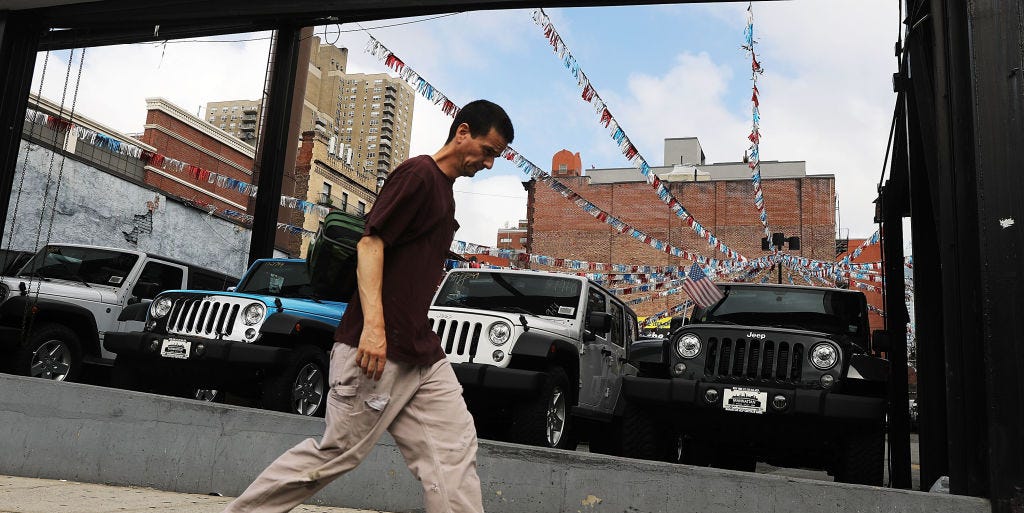
- Stay-at-home orders prompted by the spread of COVID-19 have brought economies to a screeching halt, and first-quarter auto sales are the first indicators of how detrimental the pandemic has been on car buying.
- FCA has reported a quarterly decline in U.S. sales of 10.4 percent, GM a decline of 7.1 percent. Hyundai saw its March sales drop by 43 percent.
- This page will be updated as companies report sales numbers.
U.S. new-vehicle sales for the first quarter and the month of March are rolling in, and the first indications are that the spread of COVID-19 has led to massive downturns in buying.
FCA reported a 10.4 percent decline in first-quarter sales, a decline cushioned by a 7 percent increase in Ram pickup truck sales. Ram was the only FCA brand to see an increase in sales through the last quarter; Dodge dropped 20 percent and Jeep fell 14 percent.
General Motors saw a decline of 7.1 percent in first quarter sales. Of GM’s brands, Buick took the bulk of the decline with sales falling 34.7 percent this past quarter. Pickups lessened the blow for GM, with the GMC Sierra and Chevy Silverado seeing quarterly sales increases across the heavy and light duty lineups.
Hyundai reported a year-over-year decline of 43 percent for the month of March, while the company’s quarterly sales declined by 11 percent. With the exception of models that are new for this year, such as the Venue, only the Ioniq saw a quarter-over-quarter increase in sales.
“It goes without saying that the entire world is facing a tremendous challenge that is having a significant impact on business and our normal way of life,” Randy Parker, head of sales for Hyundai Motor America, said in a statement. “We know tough days are ahead but we’re doing all we can to position the company to survive this and return to the growth trajectory we’ve been on.”
In the first quarter of 2020, Nissan–including Infiniti–saw a sales decline of 29.6 percent. Infiniti saw sales drop across the board with the exception of the QX50, while Nissan had sales increases for the Kicks, Murano, and Pathfinder. Nonetheless, Nissan’s popular Rogue took a hit of 36.3 percent this past quarter.
Mazda saw a sales decline of 41.8 percent while quarterly sales fell 4.5 percent. The Miata and CX-9 were the only models to see sales rise on a quarterly basis; all of them fell in March, some nearly 70 percent. Mitsubishi’s sales fell by 52 percent in March and 15.5 percent in the first quarter. Porsche saw a sales decline of 20.2 percent in the first quarter.
Nonetheless, with the first two months of this year being largely unaffected by COVID-19, it is expected that those who report on a quarterly basis will see a smaller decline in sales versus those that report March sales.
In a Bloomberg survey, analysts estimated that, on average, sales from the first quarter of last year compared to this past quarter would drop 6.2 percent for GM, 16.1 percent for Ford, and 9.9 percent for FCA. Ford is yet to report. Sales for the year in the U.S. are expected to see steep drops. Instead of the projected 16.5 million to 17.0 million in annual sales for 2020, analysts are now forecasting anywhere between 11.2 million and 16.0 million.
It’s not just stay-at-home orders keeping people from showrooms. Indicators show that buyer confidence has fallen the most since 2008. Additionally, unemployment claims for the week ending March 21 were the highest ever, at 3.3 million. For the week ending March 14, claims were 282,000.
To cushion COVID-19’s blow, some automakers have offered incentives not seen since the 2008 recession. Both FCA and GM are now offering zero-interest 84-month loans for borrowers with a top-tier credit history and Hyundai/Genesis will cover six months of payments for buyers who lose their jobs due to COVID-19.
Along with sales slowing, U.S. production has nearly come to a complete stop across the country. Many automakers had originally planned on suspending production for just a week or two, but those such as Ford and GM have extended the stoppages indefinitely, as the threat of COVID-19 spreading among factory employees remains high.
More than 3,900 people have died of coronavirus in the U.S., and as of Wednesday morning, nearly 190,000 people across the country had tested positive for it, according to the New York Times.
